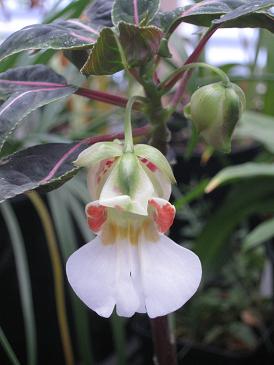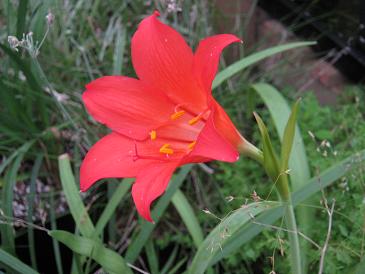JEARRARD'S HERBAL
Thats enough introduction - on with the plants!
To navigate this site, use the links above, or the detailed links at the bottom of this page.
... out in the garden.
3rd October 2010

Galanthus peshmenii .
The rain has been coming down in buckets at times during the week (which in no way explains the number of buckets I have lying around the place at present,
but that is a story for another day). I have been hoping a friend will come and help me remove some tree trunks (he has a chain saw) but it hasn't been possible,
so I have decorative tree trunks as a motif for the garden for a while yet.
Autumn has arrived without doubt, the sun is cheery but cool, and I have dug out my woolly hat and washed it.
If the change of season needed reinforcing, Galanthus peshmenii has appeared. I don't have many autumn snowdrops - the season won't really start here until January
but this has been a pleasure, and a good deal more reliable with me that G.reginae-olgae which produces enough leaves every year to keep me from throwing the pot out
but I haven't had a flower for some time.
3rd October 2010
 Hedychium 'Corelli'.
Hedychium 'Corelli'.
One of the highlights of the Hedychium season for me. This is a pretty thing, from Kobakoba originally, it was initially treated as a form of H.coronarium
but is now assumed to be a hybrid between it and H.ellipticum. Wonderful pure white flowers, the most significant thing being that it produces them!.
H.coronarium has only flowered for me once in the years I have grown it, and H.ellipticum has suffered repeatedly in the frost
so doesn't really perform well. The hybrid is reliable and makes me realise what I am missing, and why H.coronarium is so popular
in the USA. My yearning doesn't stretch as far as building a heated greenhouse to grow the parents, but I have the hybrid to cheer me up as they fail to flower
year after year.
3rd October 2010

Impatiens morsei.
One of the spectacularly not hardy species of Impatiens, I have grown it a couple of time now, and it lasts for a few years until I forget to ceep a cutting in the warm somewhere.
I bought this one last year, and sensibly decided to send the plant to a friend with warmer conditions, and kept a cutting. I have no idea how they
manage to produce it commercially, it is rather slow for me. A year later my single cutting is anout three inches taller and has a single flower,
but it is enough of a flower to be worth the effort. Too tall to fit back into the propagating case, I should probably cut the top off as a cutting and start again
, but I am pretty certain I will try to overwinter it as a larger plant, lose it in the winter and spend all spring bleating about it to anybody who will listen.
I'm not sure how many times I will try before I admit defeat, but I'm not ready to give up yet.
3rd October 2010

Cyrtanthus sanguineus .
And this is emblematic of another long term failure of mine. Somehow I have never managed to crack the problems of Amaryllis belladonna. I hve grown quite a few named forms, but they ahve always
been infected with virus. I have tried them from seed, but lost them in an accidental dessication event (whoops). I have bought dry bulbs and
discovered the wonders of importing eelworm with them. Last year I went out and bought a number of pot grown seedlings and although I have high hopes, I can't help but notice the mottled leaves
produced by the feeding of undetected mealy bugs. I want big pink trumpets in the autumn, and I don't seem to be able to do it.
Big orange trumpets, on the other hand, have been childs play!
Cyrtanthus sanguineus is easy in a pot in the greenhouse, and one of the most spectacular of the species in the genus. Looking back through my notes I find that I haven't killed it since 1987
when we had 8 inches of snow and the poly-tunnel buckled while I was inside it trying to bang the snow off. It was like being sat on by an elephant!
To find particular groups of plants I grow, click on the genus name in the table above. Click on the "Index" box at the top of the page for the full list.
I have a lot of good intentions when it comes to updating this site, and I try to keep a note
about what is going on, if you are interested.
If you want to contact me, the address is infoMONKEYjohnjearrard.co.uk
When typing the address in, please replace MONKEY with the more traditional @ symbol! I apologise for the tiresome performance involved, but I am getting too much
spam from automated systems as a result of having an address on the front page.

 Hedychium 'Corelli'.
Hedychium 'Corelli'. 
